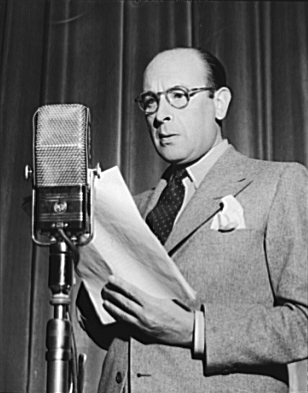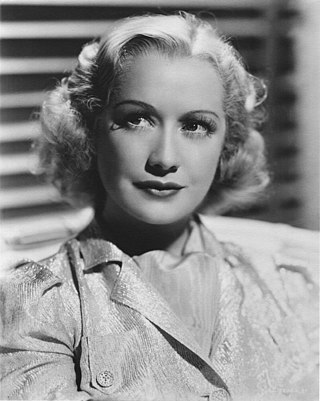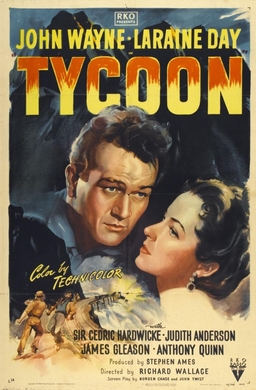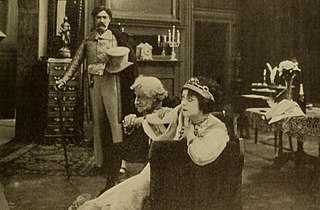
Vanity Fair is a novel by the English author William Makepeace Thackeray, which follows the lives of Becky Sharp and Amelia Sedley amid their friends and families during and after the Napoleonic Wars. It was first published as a 19-volume monthly serial from 1847 to 1848, carrying the subtitle Pen and Pencil Sketches of English Society, which reflects both its satirisation of early 19th-century British society and the many illustrations drawn by Thackeray to accompany the text. It was published as a single volume in 1848 with the subtitle A Novel without a Hero, reflecting Thackeray's interest in deconstructing his era's conventions regarding literary heroism. It is sometimes considered the "principal founder" of the Victorian domestic novel.

Sir Cedric Webster Hardwicke was an English stage and film actor whose career spanned nearly 50 years. His theatre work included notable performances in productions of the plays of Shakespeare and Shaw, and his film work included leading roles in several adapted literary classics.

Ellen Miriam Hopkins was an American actress known for her versatility. She signed with Paramount Pictures in 1930.
Vanity Fair is a 1932 American pre-Code drama film directed by Chester M. Franklin and starring Myrna Loy, Conway Tearle and Anthony Bushell. The film is modernized adaptation of William Makepeace Thackeray's 1848 novel of the same name with the original Regency-era story reset in Twentieth Century Britain. Three years later Thackeray's novel was adapted again as Becky Sharp, the first three-strip technicolor film.

Vanity Fair is a 2004 historical drama film directed by Mira Nair and adapted from William Makepeace Thackeray's 1848 novel of the same name. The novel has been the subject of numerous television and film adaptations. Nair's version made notable changes in the development of main character Becky Sharp, played by Reese Witherspoon.

Rouben Zachary Mamoulian was an American film and theater director.

Lowell Sherman was an American actor and film director. In an unusual practice for the time, he served as both actor and director on several films in the early 1930s. He later turned exclusively to directing. Having scored huge successes directing the films She Done Him Wrong and Morning Glory, he was at the height of his career when he died after a brief illness.

Alison Skipworth was an English stage and screen actress.

Kenneth Macgowan was an American film producer. He won an Academy Award for Best Color Short Film for La Cucaracha (1934), the first live-action short film made in the three-color Technicolor process.

Vanity Fair is a BBC television drama serial adaptation of William Makepeace Thackeray's 1848 novel of the same name broadcast in 1998. The screenplay was written by Andrew Davies.

Vanity Fair is a BBC television drama serial adaptation of William Makepeace Thackeray's 1848 novel of the same name broadcast in 1967. It was the first drama serial in colour produced by the BBC. Vanity Fair starred Susan Hampshire as Becky Sharp. The serial was also broadcast in 1972 in the US on PBS television as part of Masterpiece Theatre, and Hampshire received an Emmy Award for her portrayal in 1973.

Rebecca "Becky" Sharp, later describing herself as Rebecca, Lady Crawley, is the main protagonist of William Makepeace Thackeray's 1847–48 novel Vanity Fair. She is presented as a cynical social climber who uses her charms to fascinate and seduce upper-class men. This is in contrast with the clinging, dependent Amelia Sedley, her friend from school. Becky then uses Amelia as a stepping stone to gain social position. Sharp functions as a picara—a picaresque heroine—by being a social outsider who is able to expose the manners of the gentry to ridicule.

Tycoon is a 1947 American Technicolor romantic drama film directed by Richard Wallace and starring John Wayne, Laraine Day and Cedric Hardwicke. It was produced and distributed by RKO Pictures. It is based on the 1934 novel of the same name by Charles Elbert Scoggins.
Pioneer Pictures, Inc. was a Hollywood motion picture company, most noted for its early commitment to making color films. Pioneer was initially affiliated with RKO Pictures, whose production facilities in Culver City, California were used by Pioneer, and who distributed Pioneer's films. Pioneer later merged with Selznick International Pictures.

Vanity Fair (1923) is a lost silent feature film directed by Hugo Ballin and released by Samuel Goldwyn.
Archie Marshek was an American film editor whose 44-year career spanned six decades.
Vanity Fair is a 1915 silent film drama directed by Eugene Nowland and Charles Brabin and starring Mrs. Fiske, a renowned Broadway stage actress. The Edison Company produced and released the film. Mrs. Fiske had starred in the 1899 hit Broadway play Becky Sharp based on William Thackeray's 1848 novel of the same name. Here she recreates the role for Edison's cameras. This film marks Mrs. Fiske's second feature film as she had starred in Tess of the d'Urbervilles for Adolph Zukor in 1913. Despite the popularity of Vanity Fair, Mrs. Fiske never made another motion picture.
Night Life of the Gods is a 1935 American fantasy film released by Universal Pictures. Based on a 1931 novel by Thorne Smith, the film was directed by Lowell Sherman and starred Alan Mowbray as a scientist who devises a ray that can turn people to stone and bring statues to life.

Vanity Fair is a 2018 historical drama miniseries based on the 1848 novel of the same name by William Makepeace Thackeray. It was produced by Mammoth Screen and distributed by ITV and Amazon Studios.

Vanity Fair is a 1911 silent film adaptation of William Makepeace Thackeray's 1848 novel of the same name. It was one of Vitagraph's first three reel productions, along with A Tale of Two Cities (1911).
















